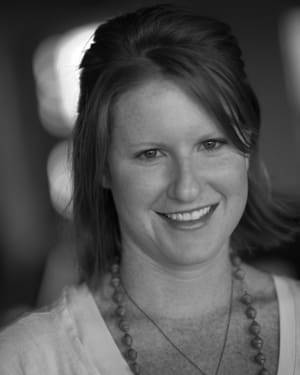Inspired by the interviews in the Paris Review and Bomb magazine, “The Questions” in Sports Illustrated, and the regular interviews on the blogs of Tom Peters and Guy Kawasaki, Comment has asked a diverse group of mentors for their stories.
Comment: How would you explain what you do to an interested nine-year-old child?
Abbie Smith: I’m in the grade that comes after college, and I study people and God. I also write books. If I ever grow up, I’ll be a doctor in a French speaking part of Africa. For now, I’m just trying to learn about the birds and the bees and what it means to be a human.
 |
Comment: What first drew you to this work?
AS: I’ve been a bit of a sociology nerd my whole life, loving the wonder of cultures, health, and people for as far back as I can remember. I was introduced to Jesus during my freshman year at Emory University, at which time the idea of “God” in cultures, health, and people, took centre-stage as my new wonder. My major was Religious Studies, and being that I focused on Eastern Religions and I had not been taught by a Christian professor, my faith was what you might call “stretched” in college. My questions were many, and I craved responses from peers in my stage of life. Sadly, however, “thinking” in the collegiate realm has been hard to find for awhile, so I decided to start the questioning process myself. And that sort-of accidentally spilled into a manuscript collecting thoughts and theories from a wide range of students exploring this idea of “faith in college.” The problem was that I wasn’t a writer (or an avid reader, for that matter), I didn’t want to be a writer, and I’d asked for a one-way ticket to Africa for graduation. All this was five years ago, though, and as of today the haphazard manuscript has been released as a book, my disenchantments with writing have taken a turn, and the one-way ticket was put on hold.
Comment: As a novice, what were your most valuable learning experiences?
AS: I’ll always be a novice in some way, so that the ongoing challenges of learning to fail, learning to risk, and learning to be loved might never cease to be experiences of deep value. And in my case, they’ve been most readily available during seasons of travel (sometimes abroad, but more often just into unknown territories of my will), risk-taking, and times where I entered intimate relationships.
Comment: What is the best advice you’ve ever been given?
AS: People will admire you for being strong, but they will love you for being weak.
Comment: From what sources do you draw inspiration for your work?
AS: Music, Pain, Water, Books, Poverty, Relationships, Film, Food, Travel, Mountains, and Rest . . . to name a few. I make it a priority always to be in relationship with a few people who could give a rip about my life’s most treasured aims. They keep me “real,” and less likely to neglect my neighbour.
Comment: What rituals and habits structure your workday?
AS: I’m not balanced. I aspire toward structure in my days, in certain hours, but rarely meet it. Furthermore, for as much as I’m finishing a masters degree in spiritual formation and the disciplines herein, I struggle to rest, I’m still learning to pray, and consider I solitude a baffling beauty. There are some habits I do every day, like reading, sleeping, and eating. There are others I schedule in most days, like walking, writing, and study. There are a remaining few that I savor some days, like yoga, reading over a class of wine, Sabbath, or sitting in a coffee shop just to listen. And then I guess there are the remaining few that schedule themselves in, whether I like it, or not, like cussing, reading trashy magazines, or revelling in Facebook.
Comment: What are your favorite tools?
AS: I guess you’ve purposefully chosen a word like “tools,” in order that I scramble to attempt what it is you’re actually asking. So if by “tools,” you mean culinary, I would say the fork. It seems to offer a healthy confidence in its purpose, and yet a robust array in its choice of audience. If you mean architecturally, however, I would have to go with the hammer. No explanation really – just seems strong and handsome. If you mean a medical tool, I’d say anesthesia. Or maybe you mean artistic, in which case I’d go with the canvas. The pencil, brush and camera are lovely assets, but without the initial space to dream, one is only left with a product, not a reflection of the soul. Lastly, I guess if you mean spiritually, I would say nature, Peets Coffee & Tea, The Message Bible translation and my prayer closet, in no particular order.
 |
Comment: Tell us about a project that delighted you.
AS: The two that readily jump to mind are my first book project and spending last summer at an AIDS orphanage in Uganda. Without a doubt, however, my most delightful (and difficult) project, has proved to be that of learning to know myself. The truth that I am seen, known and loved by God remains beyond words.
Comment: How do you plan your work?
AS: I’m not a planner, although at times I become very plan-oriented. I rarely set out to scribe a certain number of pages, or uncover a certain amount of research, but it seems like when the Trinity drops me an idea, some semblance of its plan comes, too. And if not, I’m typically so struck by the idea, that how it’s going to unfold seems relatively miniscule.
Comment: How does your work connect to other aspects of your life?
AS: At this point, at least, my work is my life. Or maybe my life is my work. My call, if you will, is becoming attuned with God. And my life, then, seems to simply mirror that overflow of becoming. My understanding is that no one aspect of life is more, or less, connected to, let alone important than, another. Furthermore, nothing is mundane and all is a marvelous opportunity for grace. I believe God is precisely at work at all times, in all persons, by way of all things.

